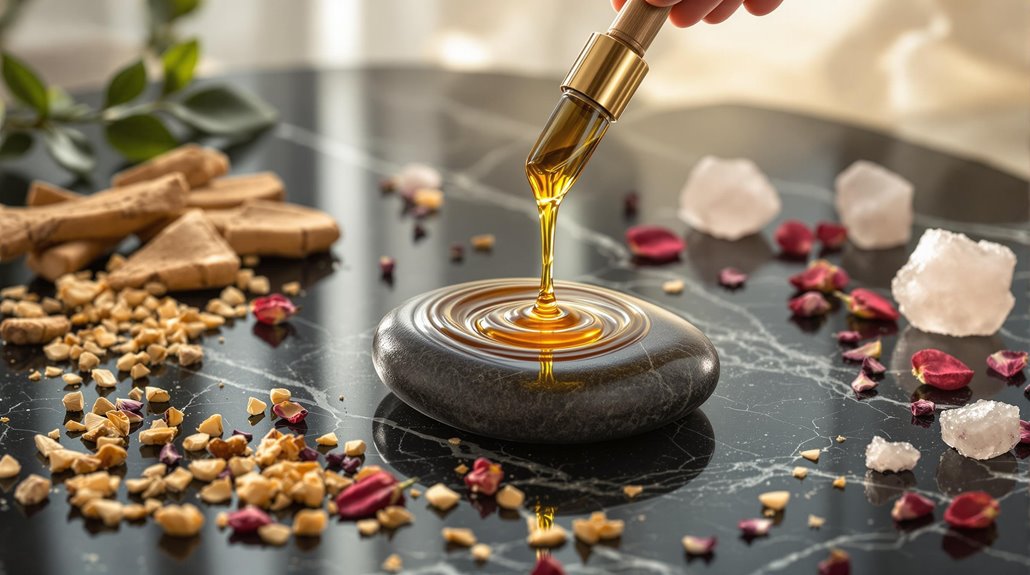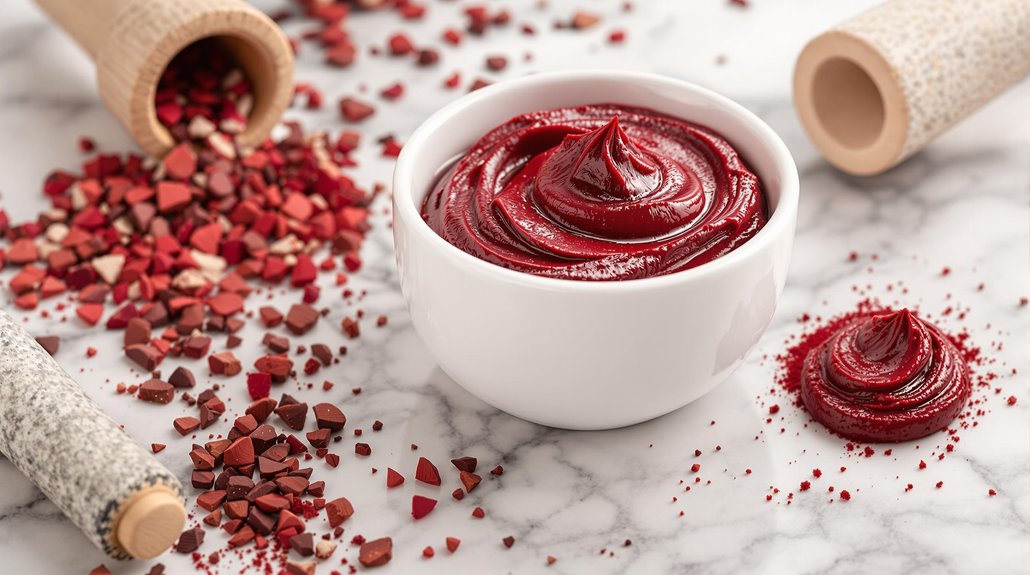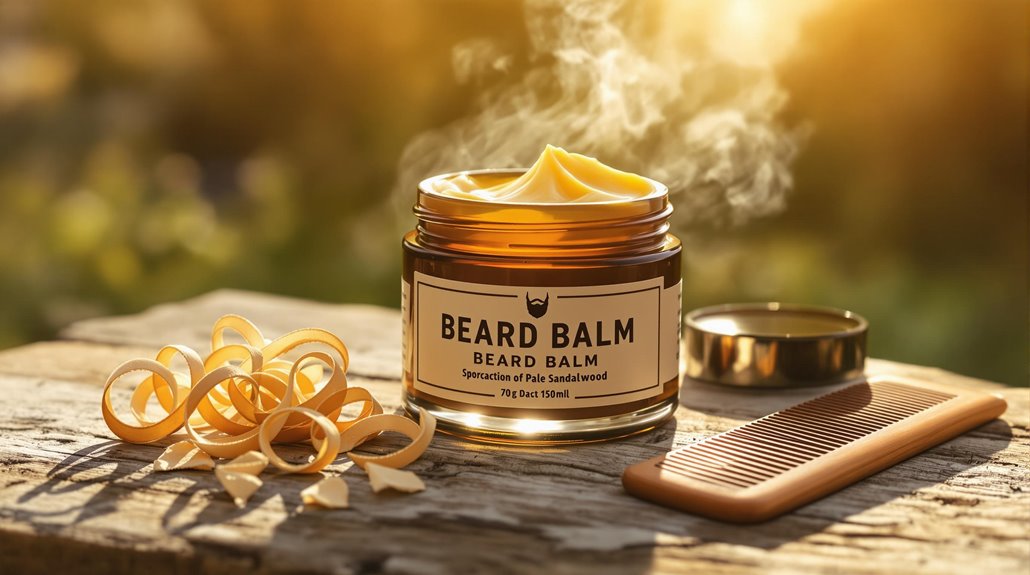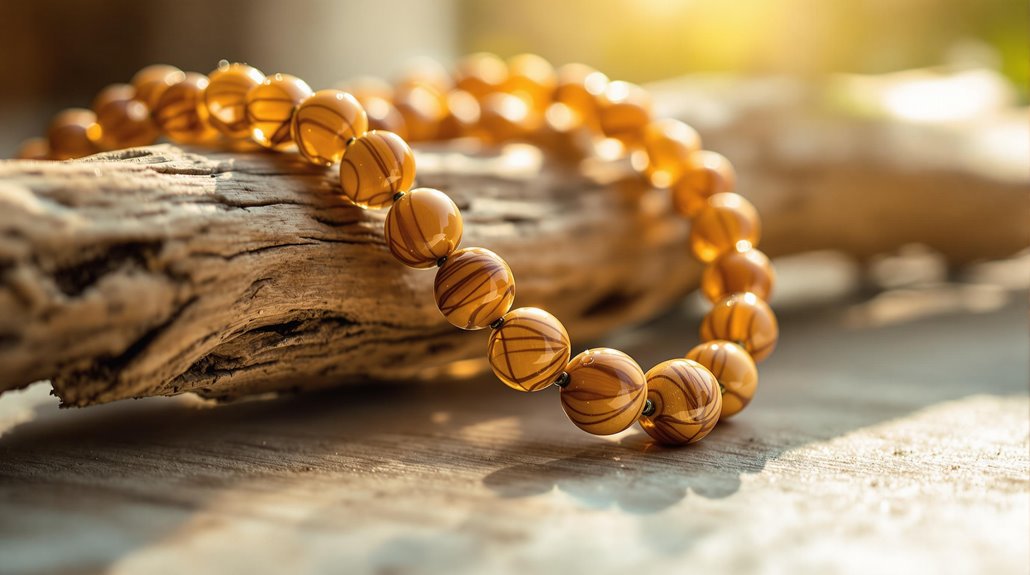Sandalwood and Turmeric Paste for Acne: Is It Effective?
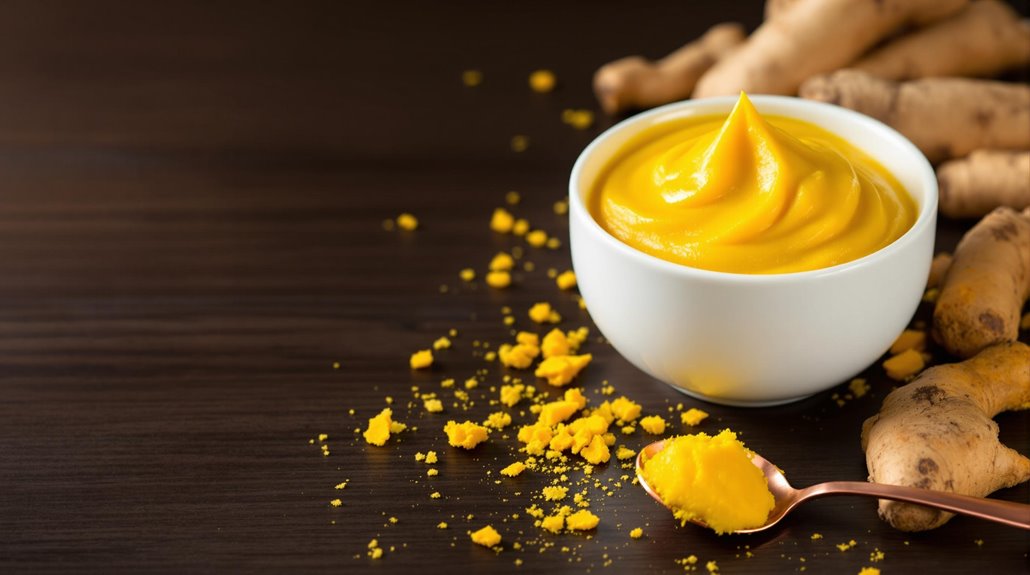
Sandalwood and turmeric paste can be a highly effective natural treatment for your acne concerns. These two powerhouse ingredients work together through their antimicrobial and anti-inflammatory properties to fight acne-causing bacteria while soothing irritated skin. You'll find that sandalwood helps regulate excess oil production, while turmeric's active compound, curcumin, reduces inflammation and promotes healing. For best results, mix equal parts of both powders with water or rose water and apply 2-3 times weekly for 15-20 minutes. Most people see noticeable improvements within 3-4 weeks of consistent use. Understanding the proper preparation and application techniques will help you maximize these natural ingredients' acne-fighting potential.
Understanding These Natural Powerhouses
When it comes to natural skincare solutions, sandalwood and turmeric stand out as time-tested ingredients that pack a powerful punch against acne. These two powerhouses have been cornerstones of Ayurvedic skin care for centuries, and modern research continues to validate their effectiveness.
Sandalwood's impressive array of properties makes it a precious ally in your fight against acne. It works as an anti-inflammatory agent to reduce redness and swelling while its antimicrobial qualities target acne-causing bacteria. The natural compounds in sandalwood help regulate sebum production and soothe irritated skin, making it an excellent choice for various skin concerns.
Turmeric's active compound, curcumin, brings its own set of benefits to the table. When you apply a mask containing turmeric, you're harnessing its potent anti-inflammatory and antibacterial properties. Combined with sandalwood, turmeric helps improve the appearance of your skin by drawing out impurities and promoting a clearer complexion. This adaptable duo works together to not only treat active breakouts but also fade existing acne scars and discoloration, offering an all-encompassing approach to natural acne treatment.
The Science Behind Skin Healing
The skin-healing properties of sandalwood and turmeric stem from their unique molecular compositions. When you apply these natural ingredients to your skin, they work together to create a powerful synergistic effect that targets multiple aspects of acne formation and healing.
Curcumin, turmeric's active compound, delivers potent anti-inflammatory and antibacterial properties that directly combat acne-causing bacteria on your skin's surface. Meanwhile, sandalwood's natural antimicrobial properties complement this action by soothing irritated skin and providing additional defense against harmful microorganisms.
You'll benefit from both ingredients' antioxidant effects, which protect your skin cells by neutralizing free radicals that can damage your skin's protective barrier. This protection is essential for maintaining healthy skin and supporting the natural healing process. Additionally, when you use sandalwood and turmeric paste regularly, it helps regulate sebum production, addressing one of the root causes of acne formation.
The combination's effectiveness lies in its comprehensive approach to skin health. While turmeric tackles inflammation and bacteria, sandalwood's soothing properties calm your skin, creating an environment that promotes healing and prevents future breakouts.
Creating Your Perfect Paste
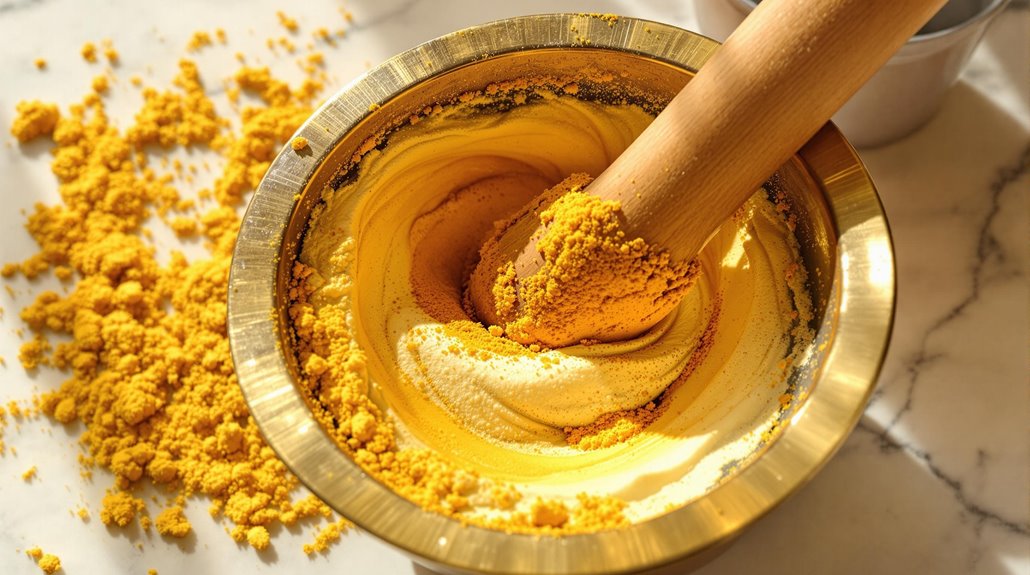
Ready to create your own healing sandalwood and turmeric paste? Start by combining equal parts of turmeric powder and sandalwood powder in a small bowl. Add a few drops of water or rose water gradually while stirring to achieve a smooth, spreadable consistency. You'll want to aim for a thick, creamy texture that won't drip when applied to your skin.
To enhance your paste's effectiveness against acne and inflammation, consider incorporating a teaspoon of honey or a few drops of tea tree essential oil. These natural ingredients pack powerful antibacterial properties that can help combat breakouts more effectively. Keep adjusting the consistency by adding small amounts of powder or liquid until you've reached the perfect balance.
Once you've perfected your mixture, apply it directly to the affected areas of your skin. Let it work its magic for 15-20 minutes before rinsing thoroughly with warm water. For the best results in achieving a radiant complexion, use this treatment 2-3 times weekly. You'll notice that consistently using this natural remedy helps reduce acne symptoms while promoting clearer, healthier-looking skin.
Application Methods That Work
Successfully applying sandalwood and turmeric paste requires specific techniques to maximize its acne-fighting benefits. When applying a Turmeric and Sandalwood face mask, start with a clean face and gently massage the mixture onto your skin using circular motions. This helps the ingredients penetrate better and can help reduce the appearance of acne while controlling excess sebum production in oily skin.
For ideal results, you'll want to leave your mask on for 15-20 minutes before rinsing with lukewarm water. You can enhance the effectiveness by combining your turmeric face mask with rose water or aloe vera gel, which adds extra soothing properties. If you're dealing with stubborn breakouts, consider incorporating your Sandalwood Face Mask routine with conventional acne treatments like benzoyl peroxide or salicylic acid.
To maintain radiant skin, apply the mask 2-3 times per week, and don't forget to supplement your topical treatment with turmeric-infused beverages. This two-pronged approach targets inflammation both externally and internally, promoting glowing skin while fighting acne-causing bacteria. Remember to perform a patch test before applying any new mixture to your entire face.
Expected Results and Timeline
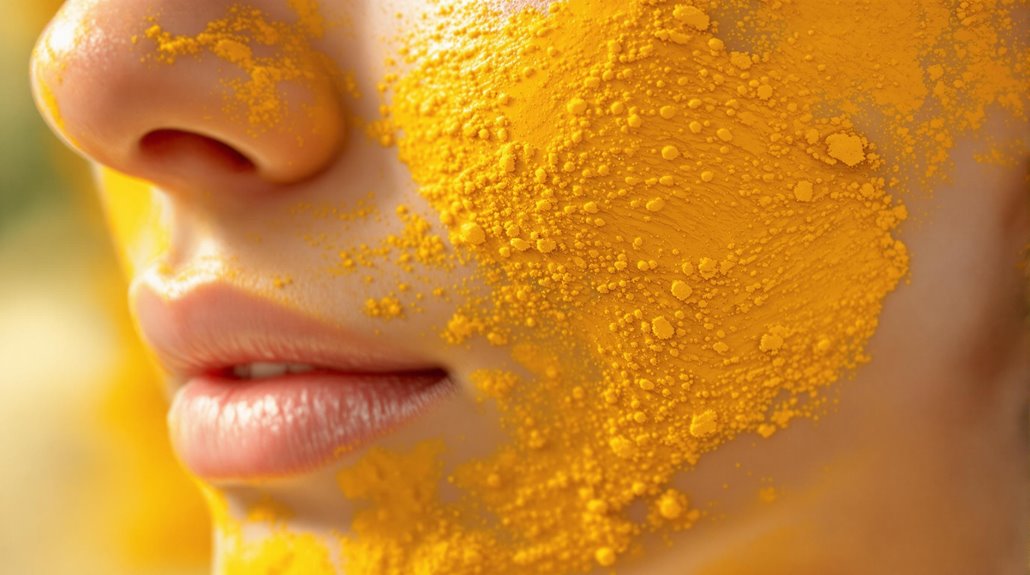
Building on proper application methods, understanding realistic expectations and timelines for results helps you stay committed to your skincare routine. When using turmeric and sandalwood paste consistently, you'll typically notice improvements within 3-4 weeks. These natural ingredients work together to combat acne-causing bacteria while maintaining your skin's natural moisture.
As reviewed by Kerry Boyle, a combination of essential oils found in sandalwood helps prevent breakouts by regulating sebum production. You'll likely notice a reduction in inflammation and active acne lesions during the first month of regular use. The paste's anti-inflammatory properties help heal existing blemishes faster, leading to smoother skin.
For acne scars and hyperpigmentation, you'll need more patience. With continued use, the paste gradually helps even out skin tone and fade dark spots. While individual results vary, this gentle remedy is safe for daily incorporation into your skincare routine. Most users report seeing significant improvements in their complexion after the first month, with better results accumulating over time as the antibacterial and anti-inflammatory properties continue to work on your skin.
Common Mistakes to Avoid
Despite the simplicity of making sandalwood and turmeric paste, several common mistakes can reduce its effectiveness or irritate your skin. First, skipping a patch test can lead to an allergic reaction, especially if you have sensitive skin. Always verify the mixture on a small area of your skin and wait 24 hours before full application.
Another mistake is using incorrect proportions when mixing ingredients. Don't eyeball measurements; use proper measuring tools and a clean mixing bowl. Many DIY recipes fail because people create a paste that's too thick or too runny. The ideal consistency should be smooth and spreadable, achieved by gradually adding lukewarm water.
You'll also want to avoid applying turmeric in excessive amounts, as it can temporarily stain your skin yellow. Start with a small amount and adjust as needed. Don't leave the paste on for longer than recommended, as this won't increase effectiveness but may cause side effects like redness or irritation.
Lastly, don't store the mixture for extended periods. Make fresh batches each time to confirm maximum potency and prevent bacterial growth that could harm your skin.
Safety and Skin Sensitivities
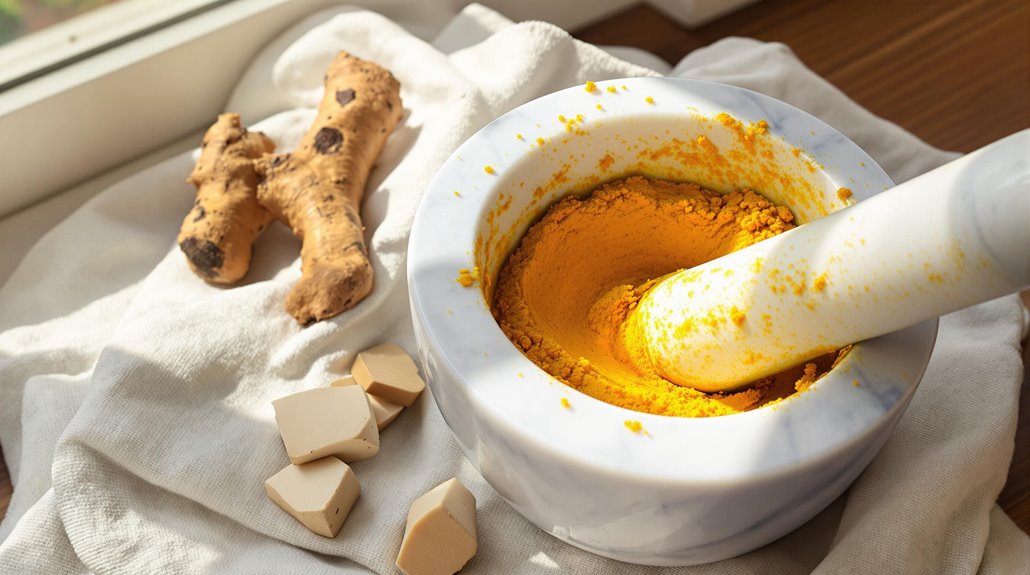
While turmeric and sandalwood offer beneficial properties for acne treatment, they can trigger adverse reactions in certain individuals. If you have sensitive skin or a history of allergic reactions, it's imperative to approach this natural remedy with caution.
Before applying the paste to your face, always perform a patch test on a small area of your skin. This simple step can help you identify potential skin sensitivities and avoid more severe reactions like contact dermatitis. Apply a small amount of the mixture to your inner forearm and wait 24 hours to observe any signs of skin irritation or redness.
If you're prone to skin conditions or have particularly sensitive skin, consult a dermatologist before incorporating this treatment into your skincare routine. They can assess your skin type and provide personalized guidance. Remember that different skin types react differently, and what works for others may not suit you. Also, be aware that the paste can temporarily stain your skin, especially if you have a lighter skin tone. To minimize adverse reactions, make certain proper storage of ingredients and follow correct dilution ratios when preparing the paste.
Alternative Natural Acne Treatments
For those who can't use sandalwood and turmeric paste due to skin sensitivities, several other natural remedies offer effective acne-fighting properties. According to Healthline Media, traditional Ayurvedic ingredients and modern natural solutions can work together to combat acne effectively.
You'll find tea tree oil particularly useful, as it provides both antimicrobial and anti-inflammatory benefits that help reduce acne breakouts. When you're looking for a gentle yet powerful treatment, consider applying raw honey to your skin. Its natural antibacterial properties make it an excellent alternative to turmeric-based treatments.
Aloe vera offers another potent option, containing natural compounds that fight inflammation while unclogging pores. You can combine it with other treatments or use it alone for its soothing properties. For those dealing with oily skin, bentonite clay masks can effectively draw out impurities and excess sebum.
Don't overlook the power of probiotics in your skincare routine. Whether applied topically or taken orally, they can help balance your skin's microbiome and reduce acne severity. These alternatives provide antioxidant and anti-inflammatory benefits similar to turmeric while being gentler on sensitive skin.

